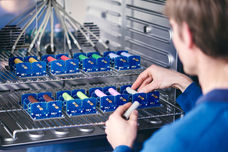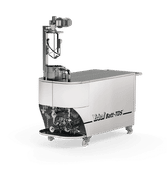Charging ahead to develop better batteries
Advertisement
Cellphones go dark during important conversations because a battery hasn't been recharged. Or the automotive industry revs up with excitement for a new battery-powered vehicle, but it needs frequent recharging. Or yardwork is delayed because the battery for your string trimmer is dead.
Researchers at The University of Texas at Dallas have developed a high-powered, environmentally safe lithium-sulfur substitute that could drastically lengthen battery life.
"Common lithium-ion batteries only have a certain capacity," said Dr. Kyeongjae "K.J." Cho, professor of materials science and engineering. "And most people want to use their phones for a longer time."
Many smartphone users are familiar with the shelf life of lithium-ion batteries. Sometimes a charge can last roughly a day. Cho said most would agree it would be more convenient if that charge lasted a week or more.
Cho, along with research associate Dr. Jeongwoon Hwang, both of the Erik Jonsson School of Engineering and Computer Science, worked with other regional scientists to improve lithium-sulfur batteries, long considered by many to be an evolution from lithium-ion batteries.
Lithium-Sulfur Might Be the Solution
Lithium-sulfur batteries have important advantages over lithium-ion batteries. According to Cho, they are less expensive to make, weigh less, store almost twice the energy of lithium-ion batteries and are better for the environment.
"A lithium-sulfur battery is what most of the research community thinks is the next generation of battery," Cho said. "It has a capacity of about three to five times higher than lithium-ion batteries, meaning if you are used to a phone lasting for three hours, you can use it for nine to 15 hours with a lithium-sulfur battery."
But lithium-sulfur batteries are not without problems. Sulfur is a poor electrical conductor and can become unstable over just several charge-and-recharge cycles. Electrodes breaking down is another reason lithium-sulfur batteries aren't mainstream.
Scientists have tried to improve lithium-sulfur batteries by putting lithium metal on one electrode and sulfur on the other. However, lithium metal often is too unstable, and sulfur too insulating. The scientists discovered a technology that produced a sulfur-carbon nanotube substance that created more conductivity on one electrode, and a nanomaterial coating to create stability for the other.
Cho and fellow researchers discovered that molybdenum, a metallic element often used to strengthen and harden steel, creates a material that adjusts the thickness of the coating when combined with two atoms of sulfur, a coating thinner than the silk of a spiderweb. They found it improved stability and compensated for poor conductivity of sulfur, thus allowing for greater power density and making lithium-sulfur batteries more commercially viable.
"This was what everyone was looking for, for a long time," Cho said. "That's the breakthrough. We are trying to suppress side reactions. It's a protection technology."
Scientists say this finding could change the way we look at batteries and experience battery life.
"We are taking this to the next step and will fully stabilize the material, and bring it to actual, practical commercial technology," Cho said.
Original publication
Other news from the department science
These products might interest you
Most read news
More news from our other portals
See the theme worlds for related content
Topic World Battery Technology
The topic world Battery Technology combines relevant knowledge in a unique way. Here you will find everything about suppliers and their products, webinars, white papers, catalogs and brochures.

Topic World Battery Technology
The topic world Battery Technology combines relevant knowledge in a unique way. Here you will find everything about suppliers and their products, webinars, white papers, catalogs and brochures.



































































